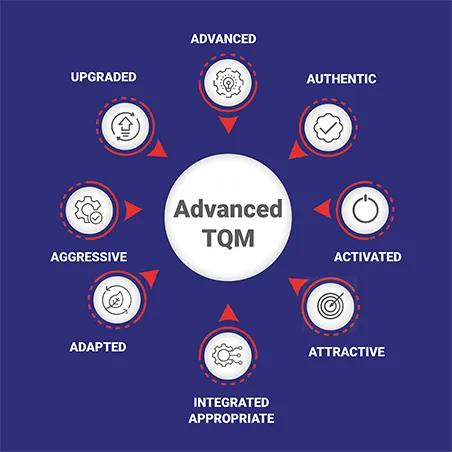
3 Ways Indian Manufacturers Can Benefit from Data Analytics
February 1, 2022
How Manufacturers Can Use Data Analytics to Drive Operational Efficiencies
February 23, 2022What is Total Quality Management (TQM) and Where Can it be Applied?
The Indian business landscape has become extremely crowded and competitive. Organizations that want to stand apart can no longer do so just on their massive product or service portfolio. To make a real difference, they need to focus on quality in every aspect of their business, the processes & systems they develop, to achieve the performance goals they set. Only with an organization-wide quality mindset, they can compete with their counterparts and emerge winners.
This is where Total Quality Management or TQM comes into the picture. Read on to find out more!
TQM – A definition
As per the Union of Japanese Scientists and Engineers (JUSE), TQM has been defined as “a set of systematic activities carried out by the entire organization to effectively and efficiently achieve the organization’s objectives so as to provide products and services with a level of quality that satisfies customers, at the appropriate time and price.”
By constantly focusing on continuous improvement or Kaizen, TQM empowers organizations to build quality into their long-term vision – rather than simply focusing on short-term gains.
TQM also prescribes a series of ways organizations can inculcate a culture of quality and accomplish their business goals. For instance, through the development of a quality strategy, availability of clean data, and tools for effective communication, TQM helps instill a discipline of quality into the organization's core foundation and processes. It also puts the spotlight on processes that organizations use for their day-to-day functioning and makes continuous amends to it to drive better results.
TQM – The benefits
As Indian companies look to differentiate themselves from the competition, TQM comes in extremely effective to achieve sustainable competitive advantage. By ensuring that the tools and workflows these organizations rely on are constantly monitored, assessed, and improved, TQM helps eliminate waste and boost efficiencies. It also plays a crucial role in enhancing employee productivity and organizational performance.
Here are some benefits:- Helps establish and uphold a culture of quality by having everyone focus on quality management and continuous improvement
- Creates long-term success and satisfaction – both for the organization as well as the customers it serves
- Identifies gaps in quality, allowing organizations to identify ways in which they can fill these deficiencies by means of tools and training
- Improves communication and collaboration between cross-functional teams through continuous knowledge sharing and accomplishment of common goals
- Minimizes the number of defects in products, thus reducing expensive fixes, product recalls, and customer complaints
- Lowers cost of product replacements, reputation damage, and customer loyalty and retention
TQM – Use cases
Organizations that practice TQM typically have their core values around quality management and continuous improvement. Such a mindset ensures that quality is the core foundation of all aspects of business operations: right from hiring to marketing, product development to customer support.
Here are 3 areas where TQM can be effectively applied:
Customer needs assessment: The ultimate goal of TQM is to foster customer trust and satisfaction by delivering products and services that keep up with their expectations. When applied correctly, TQM can enable organizations to carry out a thorough assessment of customer needs. By empowering employees with the right tools and practices and taking constant feedback from customers, TQM helps organizations in determining how the products they deliver can be improved. For instance, one large steel company adopted TQM to gain a deeper understanding of its customers. In the long run, the framework helped them create value in everything they did while driving continuous performance improvements – that resulted positively in better value to price ratio and hence higher market share in the specific products.
New product development: New product development is another area of the business that can benefit greatly from TQM. Using a structured and proven approach of understanding market needs and developing a blueprint accordingly, TQM helps in the development and timely launch of first-time-right products – with minimal or no defects. Such development not only helps in reducing cycle time and costs; it also helps in accelerating time-to-market, allowing organizations to stay a step ahead of the competition. A passenger vehicle manufacturing company used TQM in upstream processes such as New Product Planning, Marketing & Sales, Product & process design to launch several new models and variants, leading to a significant increase in sales revenue and market share.
Business performance transformation: TQM also delivers exceptional results in the area of business performance transformation. By constantly unearthing insight on process gaps and challenges, TQM aids in the creation of new value and innovation – helping companies establish high standards of quality, productivity, (and safety) at reasonable costs. TQM also empowers organizations to engage employees through initiatives such as Quality control circles, suggestion schemes, and Kaizens. A tyre manufacturing company, which won the coveted Deming Prize, successfully implemented TQM to facilitate business transformation. Using a system-based approach to tackle challenges and carry out improvements, the company has been able to leverage the framework to navigate the business towards success and drive breakthrough quality improvements.
Develop a quest for quality
In most organizations, quality is largely confined to the shop floor. But in today’s day and age where quality holds importance over everything else, the adoption of TQM principles across every aspect of the business is essential to meet customer demands, keep up with industry trends, and ensure compliance with necessary quality standards.
By having a quality focus in everything you do, TQM can help instill a shared culture of continuous improvement across the enterprise while aligning everyone on the same path to achieve quality goals and objectives. Through enhanced and constant focus on product and process quality, it helps organizations establish a differentiated & comprehensive quality management approach and develop a quest for quality.





